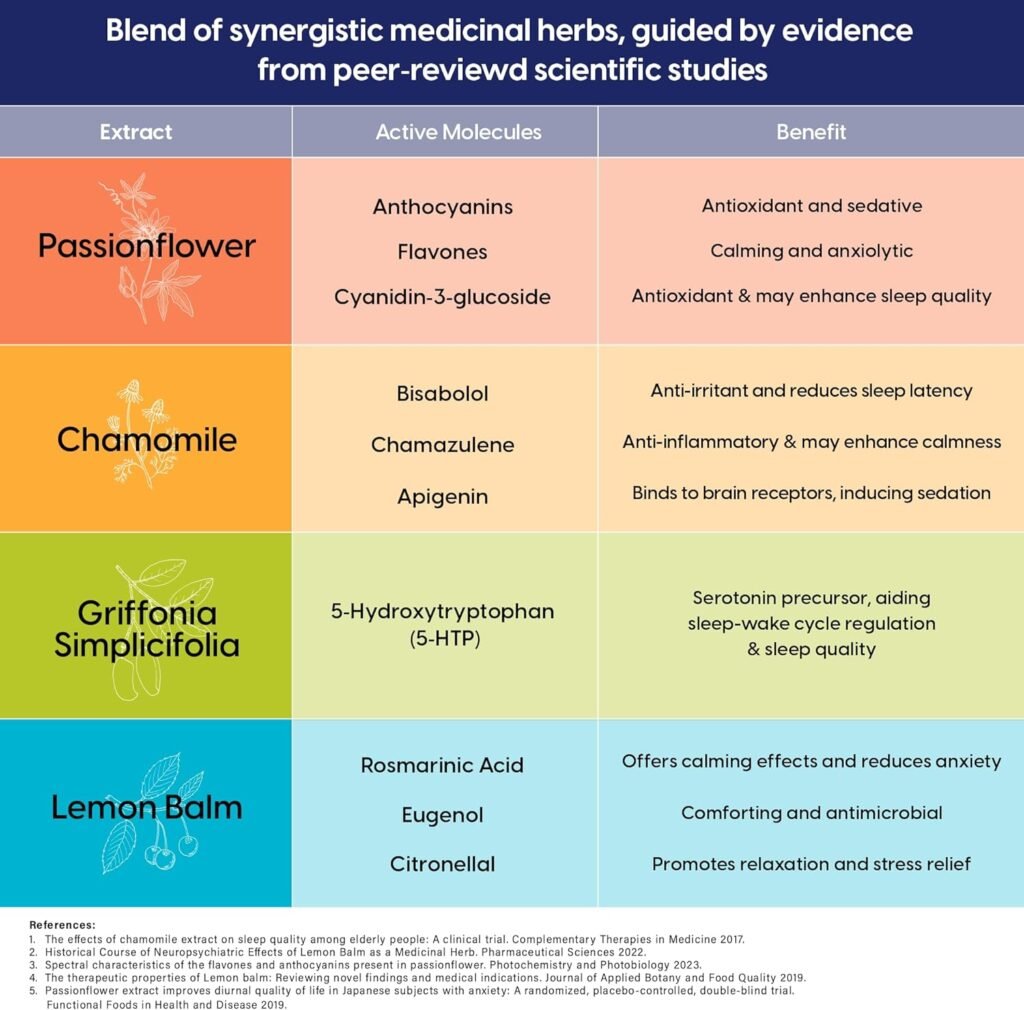This post may contain affiliate links. Which means I may receive a commission for purchases made through links, at no cost to you. I will only recommend products that I have personally used. Learn more on my Disclaimer Page and Privacy Policy Page
Tossing and turning, night after night, desperately seeking the elusive embrace of restful sleep. For many, the struggle to attain quality slumber is all too familiar—a relentless cycle of frustration and fatigue that seems impossible to break. Embracing the wisdom of ancient traditions, herbal remedies offer a gentle and holistic approach to addressing sleep disturbances, nurturing the body, mind, and spirit toward restorative rest.
What herbs can I take to improve my sleep?

- Chamomile: Chamomile is a popular herb known for its gentle sedative effects. It contains compounds that promote relaxation and may help ease anxiety, making it ideal for promoting restful sleep. Chamomile tea is a soothing bedtime beverage that can help prepare the body and mind for sleep.
- Lavender: Lavender is celebrated for its calming aroma, which has been shown to reduce stress and promote relaxation. Incorporating lavender essential oil into your bedtime routine through aromatherapy or using a lavender-scented pillow spray can help create a tranquil environment conducive to sleep.
- Valerian Root: Valerian root is a powerful herb with sedative properties that has been used for centuries to promote sleep. It contains compounds that increase levels of GABA, a neurotransmitter that induces relaxation and sleepiness. Valerian root supplements or tea can be effective for improving sleep quality.

- Passionflower: Passionflower is another herb known for its calming effects on the nervous system. It contains compounds that help reduce anxiety and promote relaxation, making it useful for improving sleep quality. Passionflower supplements or tea can help ease the mind and prepare for sleep.
- Lemon Balm: Lemon balm is a member of the mint family known for its mild sedative effects. It contains compounds that help reduce stress and promote relaxation, making it beneficial for improving sleep quality. Lemon balm tea or supplements can help calm the mind and body before bedtime.
- Ashwagandha: Ashwagandha is an adaptogenic herb that helps the body adapt to stress and promote relaxation. It can help reduce cortisol levels, a hormone associated with stress, and support better sleep quality. Ashwagandha supplements or tea can be beneficial for improving overall sleep health.
- California Poppy: California poppy is a gentle sedative herb that can help induce relaxation and improve sleep quality. It contains compounds that have mild sedative effects, making it useful for promoting restful sleep. California poppy supplements or tea can be helpful for easing into sleep.
I’m sure we’ve all heard of these methods to help us sleep!
- Maintain a Consistent Sleep Schedule: Try to go to bed and wake up at the same time every day, even on weekends. Consistency helps regulate your body’s internal clock and promotes better sleep quality.
- Get Regular Exercise: Engage in regular physical activity during the day, as it can help improve sleep quality and duration. Aim for at least 30 minutes of moderate exercise most days of the week, but avoid vigorous exercise close to bedtime, as it may energize you and make it harder to fall asleep.
- Limit Caffeine and Alcohol: Avoid consuming caffeine and alcohol in the late afternoon and evening, as they can disrupt your sleep cycle and interfere with your ability to fall asleep and stay asleep.
- Establish a Relaxing Bedtime Routine: Develop a calming pre-sleep routine to signal to your body that it’s time to wind down. This could include activities like reading a book, taking a warm bath, practicing relaxation techniques such as deep breathing or meditation, or listening to soothing music.
- Create a Comfortable Sleep Environment: Make sure your bedroom is conducive to sleep by keeping it cool, quiet, and dark. Invest in a comfortable mattress and pillows, use blackout curtains or eye masks to block out light, and use white noise machines or earplugs to minimize disturbances.
- Limit Screen Time Before Bed: The blue light emitted by screens from devices like smartphones, tablets, and computers can interfere with your body’s natural sleep-wake cycle. Try to limit screen time at least an hour before bedtime to promote better sleep.
- Watch Your Diet and Hydration: Avoid heavy meals, caffeine, and alcohol close to bedtime, as they can disrupt sleep. Instead, opt for light, easily digestible snacks if you’re hungry. Also, stay hydrated throughout the day but try to limit fluids before bedtime to minimize nighttime trips to the bathroom.
- Manage Stress and Anxiety: Practice stress-reducing techniques such as mindfulness, yoga, or journaling to help calm your mind before bed. If worries or anxieties keep you up at night, consider keeping a notepad by your bedside to jot down any thoughts or concerns that arise.
- Expose Yourself to Natural Light: Spend time outdoors during the day and expose yourself to natural sunlight, as it helps regulate your body’s internal clock and promotes better sleep at night.
But what if these don’t help!?

Here are some lesser-known facts about improving sleep:
Temperature Matters, sleeping in a cooler room (around 60-67°F or 15-20°C) can lead to better sleep quality. The body naturally cools down during sleep, and a cooler environment can facilitate this process.
The Power of Magnesium: Magnesium is a mineral that plays a crucial role in promoting relaxation and sleep. Consuming magnesium-rich foods or taking magnesium supplements may help improve sleep quality.
Humidity Levels: Maintaining optimal humidity levels (around 40-60%) in your bedroom can help prevent dryness or excessive moisture, promoting more comfortable sleep and reducing the risk of respiratory issues.
The Influence of Light Exposure: Exposure to natural sunlight during the day helps regulate your body’s internal clock and promotes better sleep at night. Getting outdoors for at least 30 minutes each day can improve sleep quality.
Napping Tips: Taking short naps (around 20-30 minutes) earlier in the day can provide a quick energy boost without disrupting nighttime sleep. Avoiding long or late-afternoon naps can help maintain a regular sleep schedule.
The power of frequency on sleep! Try even YouTubing sleep frequencies may help!
The frequency that promotes better sleep largely depends on the individual’s preferences and responses to different sounds. However, there are certain frequencies that have been associated with relaxation and improved sleep quality for many people:
- Delta Waves (0.5-4 Hz): Delta waves are the slowest brainwave frequency and are typically associated with deep, dreamless sleep. Listening to delta wave music or sounds may help induce a state of deep relaxation conducive to restorative sleep.
- Theta Waves (4-8 Hz): Theta waves are associated with relaxation, meditation, and light sleep. Listening to theta wave music or sounds may promote a sense of calmness and relaxation, facilitating the transition to sleep.
- Alpha Waves (8-12 Hz): Alpha waves are associated with a relaxed and wakeful state, often occurring during meditation or light relaxation. Listening to alpha wave music or sounds may help calm the mind and prepare for sleep.
- White Noise (20-20,000 Hz): White noise contains all frequencies in the audible range and is often used to mask background sounds that may disrupt sleep. Many people find white noise machines or apps helpful for blocking out distractions and promoting better sleep.
- Pink Noise (20-20,000 Hz): Pink noise is similar to white noise but has a more balanced distribution of frequencies, with higher intensity at lower frequencies. Some research suggests that pink noise may help improve deep sleep and memory consolidation.
- Nature Sounds: Sounds of nature, such as ocean waves, rainfall, or rustling leaves, are often used to promote relaxation and reduce stress. Listening to nature sounds before bedtime may help create a calming sleep environment.
The military method, also known as the 4-7-8 technique, is a simple and effective strategy for falling asleep quickly. Here’s how to practice it!
- Relax Your Body: Start by finding a comfortable position in bed and releasing tension from your muscles. You can do this by gently scanning your body from head to toe and consciously relaxing each muscle group.
- Breathe In: Close your mouth and inhale quietly through your nose for a count of four seconds. Focus on filling your lungs with air and expanding your abdomen as you breathe in.
- Hold Your Breath: After inhaling, hold your breath for a count of seven seconds. During this pause, try to remain calm and relaxed, allowing your body to settle into a state of stillness.
- Exhale Slowly: Next, exhale forcefully through your mouth for a count of eight seconds. Focus on fully emptying your lungs and releasing any tension or stress with each breath out.
- Repeat the Cycle: Continue to repeat the 4-7-8 breathing cycle for several minutes or until you feel yourself becoming more relaxed and sleepy. It’s essential to maintain a steady rhythm and focus on your breath throughout the process.
The military method is a simple yet powerful technique that can help quiet your mind, reduce stress and anxiety, and promote relaxation, making it easier to fall asleep quickly. Practice this technique regularly, especially when you’re having difficulty falling asleep, to improve your sleep quality and overall well-being.
Valerian root, a herbal remedy with a long history of use, is renowned for its ability to promote relaxation and improve sleep quality. The active compounds in valerian root, including valerenic acid and valepotriates, interact with the brain’s neurotransmitters, particularly gamma-aminobutyric acid (GABA), which plays a crucial role in regulating nerve impulses. By increasing GABA levels in the brain, valerian root exerts a calming effect on the nervous system, helping to alleviate feelings of anxiety and stress that can interfere with sleep onset. This calming action makes it easier for individuals to unwind and prepare for restful sleep, leading to faster sleep onset and reduced nighttime awakenings.
Try these for a more restorative sleep for 2-4 weeks and let me know your thoughts in the comments!

Click here!
Moreover, valerian root has been shown to improve sleep quality by enhancing sleep architecture and promoting deeper, more restorative sleep cycles. Research suggests that valerian root may increase the amount of time spent in deep sleep, also known as slow-wave sleep, which is essential for physical and mental rejuvenation. By facilitating a more profound state of relaxation and promoting overall sleep continuity, valerian root helps individuals achieve a more restful and refreshing night’s sleep. Its natural sedative properties offer a gentle and non-habit-forming alternative to prescription sleep medications, making it a popular choice for those seeking natural remedies to support healthy sleep patterns.
Try these for help falling asleep!
As someone who deeply values the importance of restful sleep, I am dedicated to helping you find natural solutions to improve your sleep quality using herbs. I understand how crucial it is to feel well-rested and rejuvenated each morning, and I am committed to guiding you towards the best herbal remedies that can support your sleep goals. Whether it’s soothing teas infused with calming herbs like chamomile and valerian root or herbal supplements carefully selected to promote relaxation and tranquility, I am here to provide personalized recommendations tailored to your unique needs. With a genuine desire to see you experience the benefits of restorative sleep, I am passionate about sharing my knowledge and expertise to help you achieve a peaceful night’s rest using the power of nature’s remedies.





